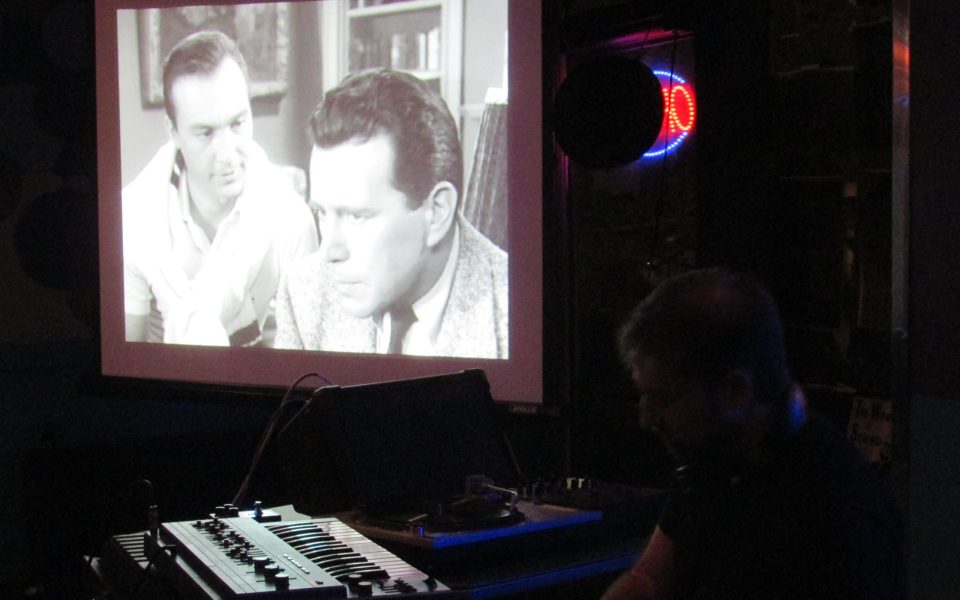by Jordan Green
A sense of foreboding hung in the air at Greensboro’s New York Pizza three days before North Carolina’s presidential primary despite the festivities surrounding musician Matty Sheets’ 40th birthday.
Cue Episode 2 in Season 1 of “Alfred Hitchcock Presents,” which originally screened in October 1955, with the master of cinematic suspense intoning at the opening: “Good evening. Have you ever had a premonition? A feeling that something dreadful was about to happen?”
Drummer Nic Stott tapped out a lean, staccato signature, like the beginning of a bebop jazz solo or exposition of an early ’70s Blaxploitation film.
Then, as Stott settled into a trap groove and Ben Singer sketched single-note patterns on an electric piano, the video cut away from Alfred Hitchcock to “Confessions of a Republican,” a four-minute campaign ad featuring the actor William Bogert explaining why he couldn’t vote for Barry Goldwater, the 1964 Republican nominee for president, who famously opposed the Civil Rights Act and said: “Extremism in defense of liberty is no vice.”
“When the head of the Ku Klux Klan, when all these weird groups come out in favor of the candidate of my party; either they’re not Republicans or I’m not,” Bogert says in the film, which eerily parallels the current GOP anxiety about the rise of Donald Trump and his unconvincing disavowal of white supremacist David Duke.
Stott’s restrained drumming, tight as a steel trap, intensified while Singer added bass tones from his piano; the music swelled with a sense of history pulsating into a new and unexpected dimension.
Singer, the creative author of Modern Robot, has produced about 50 performances over the past six years. Starting with Sita Sings the Blues, and then working through a series of B-movies like Plan 9 From Outer Space and Barbarella, Singer and typically one or two collaborators would improvise a musical soundtrack as the films played. With the exception of the show built around the 1926 film Faust, which Singer took to Edinburgh Festival Fringe in Scotland last year, the performances have been one-offs.
A trained euphonium player and pianist, Singer took up guitar when he moved to Greensboro in 2005 and immersed himself in Piedmont blues and other folk music. He also plunged into the open-mic scene and developed his chops as an accompanist with singer-songwriters like Sheets. He started Modern Robot as a separate and parallel endeavor to play almost completely improvised music, in contrast to the traditional song structures of his other work. In the process, he taught himself how to record and edit sound and video, plying his talents with musicians such as Laurelyn Dossett and Rhiannon Giddens and filmmakers including Harvey Robinson and Andrew Rodgers.
Inspired by a vinyl LP, The World in Sound 1965 Produced by the Associated Press, the March 12 show originated somewhat differently. Listening to the news items on the vinyl recording, Singer was amazed to discover how deeply they resonated with the current historical moment: Here was President Johnson speaking about an ambitious legislative agenda, contrasted with current times when Congress can’t seem to accomplish anything. Here was the passage of the Voting Rights Act, which would be significantly unraveled by the Supreme Court’s 2013 Shelby v. Holder decision. Here was the creation of Medicare and Medicaid prompting hysterical right-wing charges of socialism — a precursor to similar charges against President Obama. Here was the Watts riots, foreshadowing militant anger today about unarmed black men killed by the police and mass incarceration.
Singer scrambled to find a film to accompany the musical performance in the 30 hours leading up to the event, describing the task as the most creative aspect of the process. Alfred Hitchcock’s “Premonition” proved to be an uncanny choice for animating the political themes that Singer is exploring.
The 1955 episode created a feverish and surreal narrative framework for the music as pianist Kim Stanger, portrayed by John Forsythe, returns from Paris seeking to reunite with his estranged father. His family and friends seem deeply uncomfortable to see him and tell him that his father died four years ago of a heart attack while playing tennis, but the story doesn’t add up and Forsythe’s character tumbles into a psychological rabbit hole trying to unravel the contradictions.
Although The World In Sound 1965 provided the inspiration for the performance, “Premonition” wound up taking a more prominent role, although snatches of the audio news clips cropped up here and there, including President Johnson’s State of the Union (“I propose that we carry out a new program to develop regions of our country that are now suffering from distress and depression; I propose that we make new efforts to control and prevent crime and delinquency; I propose that we eliminate every remaining obstacle to the right and the opportunity to vote.”) amidst the dialogue in “Premonition” and the swell of Singer and Stott’s music.
Singer may have inadvertently upstaged himself by helping to organize a surprise tribute to Matty Sheets, a longtime musical collaborator. As an opening act to the Modern Robot show, about a dozen friends, including Singer, performed covers of Sheets’ songs to the songwriter and bandleader’s delight. The celebratory atmosphere, with Singer and Stott embracing Sheets at the bar during the changeover, carried into Modern Robot’s set. Whether they were in on the conceit or just familiar with their Hitchcock, Sheets and his friends raucously yelled lines of dialogue from the bar during the Modern Robot performance.
Lest there be any misunderstanding that Singer’s choice to highlight the failed Goldwater campaign of 1964 signals a faith that the system will right itself, the artist screened parts of Night of the Living Dead at the beginning of the program. The classic 1968 horror movie directed by George Romero is widely viewed as an allegory for the anxiety provoked by urban rioting during the Johnson administration, which set the stage for a conservative resurgence under the theme of law and order, giving rise to the war on drugs and mass incarceration. And if any proof were needed that political history is cyclical, conservative columnist George F. Will would later write that Goldwater “sensed that he had won the future.” He added, “We — 27,178,188 of us — who voted for him in 1964 believe he won, it just took 16 years to count the votes.”
Which brings us back to the swirling layers of unreality in the disbelief by the modern GOP that Trump has taken over their party, and Kim Stanger’s horrific realization about the true circumstances of his father’s death.
“You’ve never been in Paris,” his brother’s wife and his former girlfriend Susan — played by Cloris Leachman — tells him. “You’ve been in a hospital in Arizona.”
Join the First Amendment Society, a membership that goes directly to funding TCB‘s newsroom.
We believe that reporting can save the world.
The TCB First Amendment Society recognizes the vital role of a free, unfettered press with a bundling of local experiences designed to build community, and unique engagements with our newsroom that will help you understand, and shape, local journalism’s critical role in uplifting the people in our cities.
All revenue goes directly into the newsroom as reporters’ salaries and freelance commissions.





Check out Peninzula’s Band camp page. New Duo from GSO.